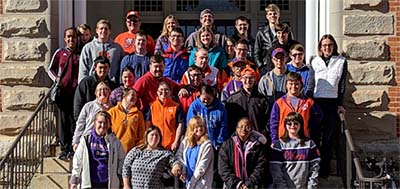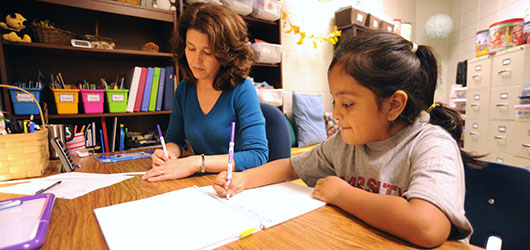-
Academics
- Academics Overview
-
Undergraduate
- Undergraduate Overview
- Agricultural Education
- Early Childhood Education, B.A.
- Elementary Education, B.A.
- Middle Level Education, B.S.
- Mathematics Teaching, B.S.
- Modern Languages Education, B.A.
- Special Education, B.A.
- Secondary Education, B.A.
- Science Teaching, B.S./B.A.
- Athletic Leadership Minor
- Human Capital Education and Development
-
Master's and Specialist Programs
- Master's and Specialist Programs Overview
- Athletic Leadership (Online)
- Counselor Education
- Educational Leadership
- Human Resource Development
- Learning Sciences
- Literacy (Online)
- Middle Level Education, MAT
- Modern Languages, MAT
- Secondary Education, MAT
- Special Education (Online)
- Student Affairs
- Teaching and Learning (Online)
- Teaching and Learning, Ed.S.
- Doctoral Programs
- Certificates | Endorsements | Licensure
- Expressway to Tiger Town
- Bachelor's To Master's | Teacher Residency
- Teaching Fellows
- Research
- Programs
- Students
- About
Educational Initiatives | Labs | Centers and Institutes
Educational Initiatives

Call Me MISTER®
The mission of the Call Me MISTER® initiative, a partnership of colleges and universities in S.C. and across the nation, is to increase the pool of available teachers from a broader and more diverse background, particularly among the state's lowest performing elementary schools. Student participants are largely selected from among underserved, socioeconomically disadvantaged and educationally at-risk communities.
ClemsonLIFE™
ClemsonLIFE™ provides premier collegiate experiences for young people with intellectual disabilities, preparing them for competitive employment and independent living.
STEM/STEAM
The College of Education is home to a variety of science, technology, engineering and math (STEM) and science, technology, engineering, arts and math (STEAM) initiatives. Among our efforts are leading a Clemson-wide STEAM ecosystem effort to serve South Carolina's most underserved communities, providing quality professional development opportunities, offering scholarships for STEM graduates who want to enter the classroom and helping build an award-winning STEAM middle school from scratch.
Upstate Writing Project
The Upstate Writing Project (UWP) is an official National Writing Project site supported by the financial and professional resources of Clemson University and local school districts. UWP has primary goals that follow the National Writing Project model, which is based on the beliefs that teachers are the key to education reform, teachers make the best teachers of other teachers and teachers benefit from studying and conducting research.
Teaching Fellows
Clemson University is a proud participant in the South Carolina Teaching Fellows Program, designed to recruit high-achieving, talented high school seniors into the teaching profession and equip them to become effective and successful educators. Each year, the program provides state-funded fellowships for South Carolina students who wish to pursue an education degree and a career in South Carolina’s public schools. Fellows receive up to $6,000 per year for four years in forgivable student loans while they complete coursework that leads to S.C. teacher licensure. Fellows agree to teach in South Carolina public schools one year for every year they are fellows. Teaching Fellows awards can be combined with other state scholarships and loans.
Clemson University Teacher Learning Progression
Clemson University’s Teacher Learning Progression (CU-TLP) initiative is designed to improve STEM teacher effectiveness, STEM teacher retention, and student achievement in South Carolina’s high-needs middle schools. By offering Personalized Advanced Credentials for Teachers, CU-TLP creates pathways for STEM, computer science, and social-emotional skill development.
Labs

Arts and Creativity Lab
The Arts and Creativity Lab allows for concentrated work in both the visual and performing arts in education. A visual art with seminar space and a performing arts space with a specialized performance floor have been modeled after professional arts studios and designed to create a comfortable and non-intimidating environment for creative work and arts integration in early childhood, elementary and special education.
Child Learning and Development Lab
The Child Learning and Development Lab (CLAD) at the College of Education brings together faculty and students to address issues relating to the healthy development and learning of young children. Our members lead research, teaching and service projects in collaboration with multiple stakeholders in the state of South Carolina and around the world. The mission of CLAD Lab is to leverage interdisciplinary approaches to advance the healthy development and learning of young children in South Carolina and around the world.
Digital Media and Learning Labs
The mission of the Digital Media and Learning Labs is to create a culture of participation with digital media technologies by providing media “hangouts” fostering creativity, production and learning, supported by community members.
IDEA Lab
The IDEA (Inclusive Digital Education and Analytics) Lab is located at Clemson University in the College of Education. Our research is focused on designing inclusive digital learning environments in engineering, computer science, and computational statistics. We also develop and implement innovative and inclusive analytics approaches to make sense of student learning.
Centers and Institutes

Center of Excellence for Digital Media and Learning
The Center of Excellence for Digital Media and Learning prepares preservice teachers, collaborates with in-service teachers, and conducts DML research in order to provide educators with a theoretical and pedagogical understanding of how teaching and learning is impacted by technology.
Center of Excellence for Innovation in Mathematics and Science
Center of Excellence for Innovation in Mathematics and Science improves the motivation, potential and achievement of students and teachers through sustained engagement in science, math, engineering and technology. Goals include increasing student achievement and improving math and science teaching.
Center for the Recruitment and Retention of Diverse Educators
Center for the Recruitment and Retention of Diverse Educators (CRe2DE) researches, designs, and implements the best strategies for recruiting and retaining diverse educators in the state of South Carolina, in conjunction with partners in designated high-poverty school districts and neighboring two- and four-year institutions of higher education. CRe2DE is creating infrastructure to support diverse educator development and building a clearinghouse of best practice resources to guide their early identification, preparation experiences, and professional culture of support. The primary goal of the Center is to create greater demographic parity between the state’s teacher workforce and its student population.
Education Media Center
The Education Media Center is a curriculum materials library that primarily supports the students, faculty and staff of Clemson University’s College of Education by providing spaces, resources and services to facilitate the development of educators, counselors, administrators, training and development specialists, and all learners.
LEADERS Center of Excellence
Based at Clemson University’s College of Education, the LEADERS Center of Excellence aims to use leadership coaching and improvement science to improve school leadership practice in rural, underperforming, and high-poverty schools in ways that will increase teacher retention and student learning outcomes.
Early Literacy Center for South Carolina
The Early Literacy Center for South Carolina prepares reading interventionists and classroom teachers to implement the science of reading and research-based intervention and instruction. The goal of the program is to bring student’s literacy skills within the average range of their peers’ achievements.
